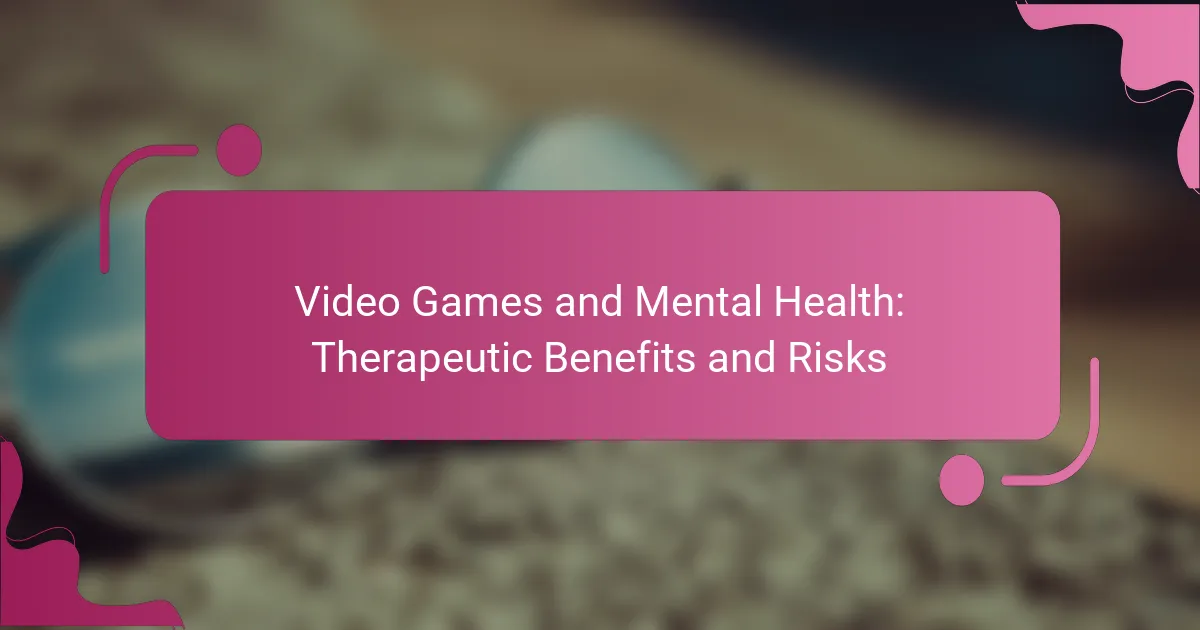Video games can significantly impact mental health, offering both therapeutic benefits and potential risks. They enhance cognitive skills, reduce stress, and foster social connections through immersive gameplay. However, excessive gaming may lead to increased anxiety, social isolation, and disrupted sleep patterns. Understanding the cultural perceptions and misconceptions surrounding gaming is crucial for recognizing its complex relationship with mental well-being.
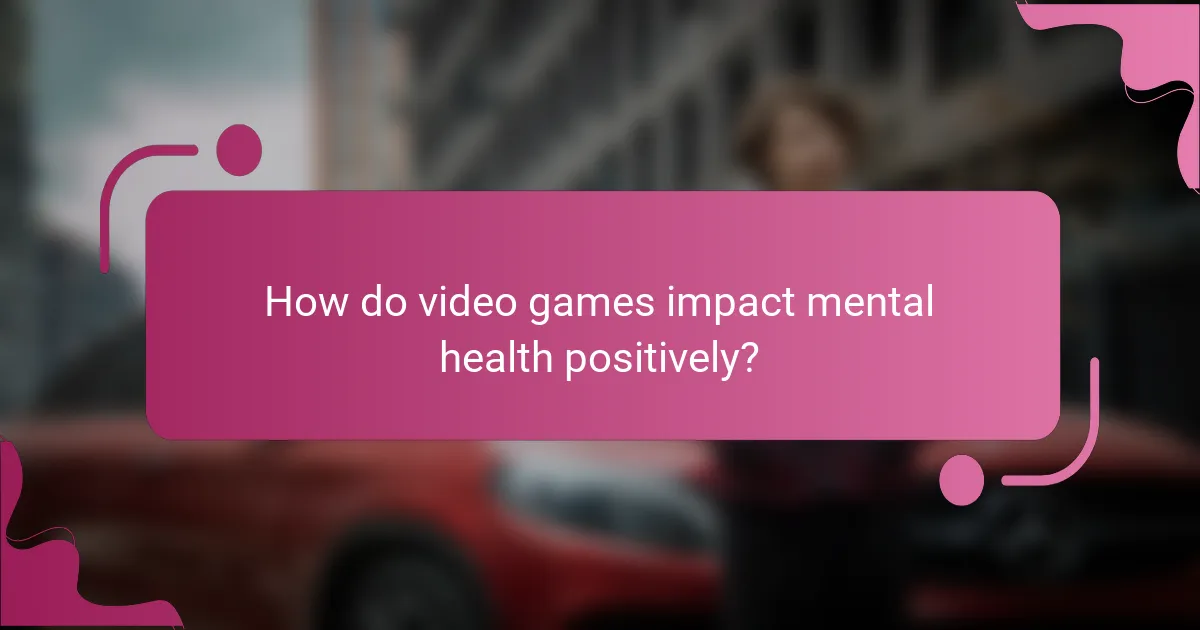
How do video games impact mental health positively?
Video games can positively impact mental health by enhancing cognitive skills, reducing stress, and fostering social connections. Engaging in gameplay can improve problem-solving abilities and boost mood through immersive experiences. For example, studies show that action games can enhance visual attention and spatial awareness. Additionally, multiplayer games promote teamwork and communication, which can alleviate feelings of isolation. As a result, video games serve as effective tools for mental well-being when used mindfully.
What therapeutic benefits do video games offer?
Video games offer various therapeutic benefits, including improved cognitive function, enhanced social skills, and stress relief. They can help reduce symptoms of anxiety and depression through immersive experiences and engagement. Research indicates that certain games promote emotional resilience and problem-solving abilities. For instance, action games can improve reaction times and spatial awareness, while cooperative games foster teamwork and communication skills.
Which psychological conditions can be alleviated by gaming?
Video games can alleviate various psychological conditions, including anxiety, depression, and PTSD. Research indicates that gaming provides a sense of accomplishment, social connection, and distraction from negative thoughts. For example, studies show that engaging in cooperative gameplay can foster social bonds, reducing feelings of isolation. Additionally, specific games designed for therapeutic purposes can help users practice coping strategies and improve emotional regulation.
How do different genres of games affect mental well-being?
Different genres of games can have varying effects on mental well-being. Action games may enhance cognitive skills, while puzzle games promote problem-solving abilities. Role-playing games often foster social connections, improving emotional health. Conversely, excessive gaming can lead to negative outcomes, such as increased anxiety or social isolation. Balancing game choice with time spent is crucial for maximizing therapeutic benefits while minimizing risks.
What role do social interactions in gaming play in mental health?
Social interactions in gaming can significantly enhance mental health by providing community support and reducing feelings of isolation. Engaging with others fosters a sense of belonging, which is crucial for emotional well-being. Studies show that multiplayer games can improve social skills and boost self-esteem through teamwork and communication. Additionally, players often share experiences and strategies, creating a supportive environment that can alleviate stress and anxiety. This unique attribute of gaming as a social platform highlights its therapeutic potential in promoting mental health.
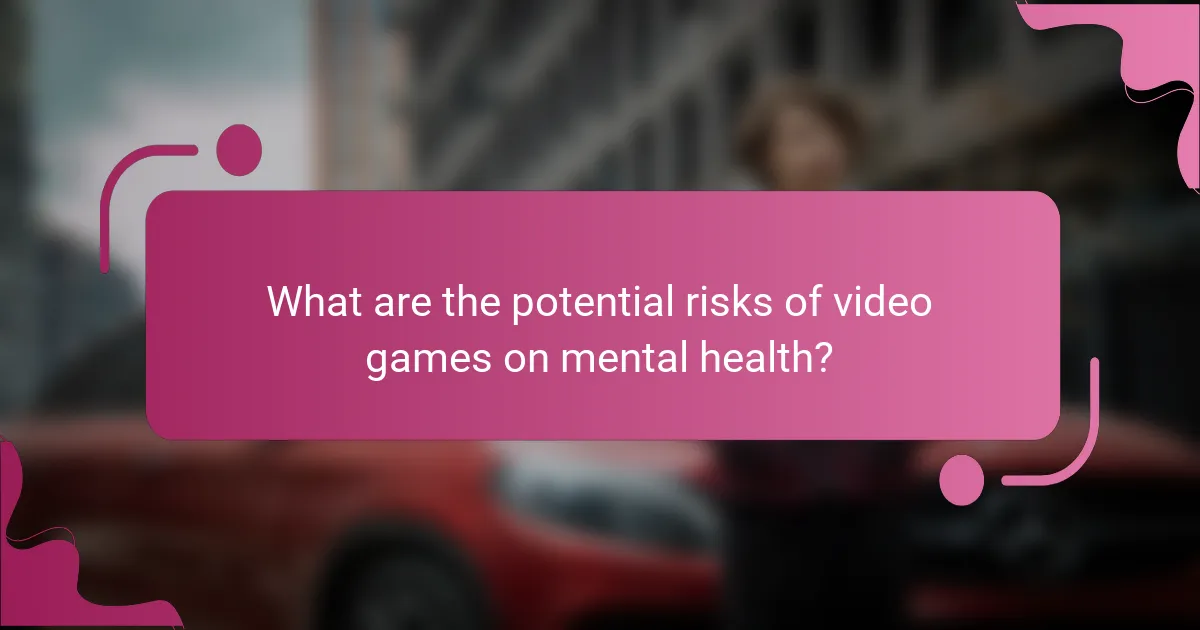
What are the potential risks of video games on mental health?
Video games can pose several risks to mental health, including increased anxiety and depression. Excessive gaming may lead to social isolation, reduced physical activity, and disrupted sleep patterns. Studies indicate that individuals with pre-existing mental health conditions may experience exacerbated symptoms due to gaming. Additionally, the immersive nature of video games can lead to addiction, impacting daily functioning and relationships.
How can excessive gaming lead to mental health issues?
Excessive gaming can lead to mental health issues such as anxiety and depression. Prolonged gaming may disrupt sleep patterns, reduce physical activity, and impair social interactions. Research indicates that individuals who game excessively often experience increased feelings of isolation and stress. As a result, it is essential to maintain a balanced approach to gaming to mitigate these risks.
Which demographics are most vulnerable to gaming-related mental health problems?
Adolescents and young adults are the demographics most vulnerable to gaming-related mental health problems. Research indicates that these age groups often experience higher levels of anxiety and depression linked to excessive gaming. Additionally, individuals with pre-existing mental health issues may also face increased risks when engaging in gaming. Factors such as social isolation and gaming addiction further exacerbate these vulnerabilities. Understanding these demographics helps in developing targeted interventions for mental health support.
What are the signs of gaming addiction and its effects on mental health?
Signs of gaming addiction include excessive playtime, neglect of responsibilities, and withdrawal symptoms. These behaviors can lead to negative effects on mental health, such as increased anxiety, depression, and social isolation. Studies indicate that individuals with gaming addiction may experience impaired cognitive function and emotional regulation. Addressing these signs early can mitigate long-term mental health issues.

What unique attributes of video games contribute to their therapeutic potential?
Video games offer unique attributes that enhance their therapeutic potential, including immersive environments, interactive storytelling, and social connectivity. These features foster engagement and emotional expression. Immersive gameplay can distract from stressors, while narrative elements promote self-reflection. Additionally, multiplayer modes facilitate social interactions, combating isolation. These aspects contribute to improved mental well-being by providing players with coping mechanisms and a sense of community.
How do immersive experiences in video games aid in therapy?
Immersive experiences in video games can significantly aid in therapy by enhancing engagement and emotional connection. These experiences create safe environments for users to explore feelings, confront fears, and practice coping strategies. Virtual reality (VR) applications allow for controlled exposure therapy, helping individuals with anxiety or PTSD by simulating real-life situations. Studies indicate that patients often show improved outcomes, such as reduced symptoms of depression and anxiety, when participating in therapeutic gaming sessions. Additionally, the interactive nature of games fosters a sense of agency, empowering users to take control of their healing process.
What is the significance of narrative and storytelling in games for mental health?
Narrative and storytelling in games significantly enhance mental health by fostering emotional connections and providing escapism. They allow players to explore complex themes, which can lead to personal reflection and growth. Engaging narratives can improve mood and reduce anxiety by immersing players in alternate realities. Furthermore, storytelling facilitates social interaction, promoting community and support among players, which is vital for mental well-being.
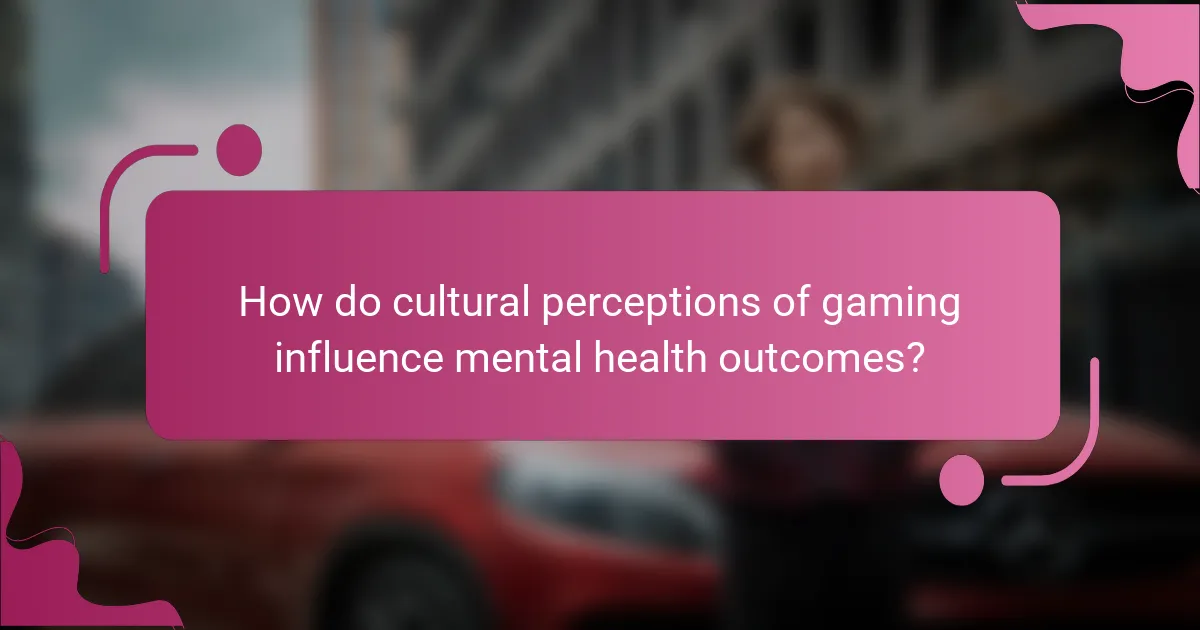
How do cultural perceptions of gaming influence mental health outcomes?
Cultural perceptions of gaming significantly shape mental health outcomes by influencing how individuals engage with video games. Positive cultural views can enhance social connections and provide therapeutic benefits, while negative perceptions may lead to stigma and isolation.
For example, cultures that embrace gaming as a form of social interaction often see improved mental well-being among players. In contrast, societies that view gaming as a harmful addiction may contribute to increased anxiety and depression in gamers.
Research indicates that 70% of gamers report gaming as a stress-reliever, highlighting the therapeutic potential of gaming in supportive environments. Conversely, negative stereotypes can exacerbate feelings of shame and withdrawal, impacting overall mental health.
Ultimately, the cultural context surrounding gaming plays a crucial role in determining whether its impact on mental health is beneficial or detrimental.
What are the differences in gaming habits across various regions?
Gaming habits vary significantly across regions due to cultural influences, access to technology, and social norms. For instance, in North America, competitive gaming and esports are prevalent, while in Asia, mobile gaming dominates.
| Region | Key Gaming Habit | Preferred Platform | Social Interaction |
|—————-|——————————-|———————-|—————————–|
| North America | High engagement in esports | PC and consoles | Online communities |
| Europe | Diverse gaming genres | Various platforms | Local gaming events |
| Asia | Dominance of mobile gaming | Smartphones | Social gaming apps |
| Latin America | Growing interest in multiplayer | Consoles and PCs | Cooperative gameplay |
| Africa | Emerging gaming market | Mobile devices | Increasing online presence |
How do local attitudes towards gaming shape its therapeutic use?
Local attitudes towards gaming significantly influence its therapeutic use. Positive perceptions can enhance acceptance, encouraging mental health professionals to integrate video games into treatment plans. In contrast, negative attitudes may limit access and utilization. Cultural beliefs about gaming, such as viewing it as a waste of time or harmful, can deter individuals from exploring its benefits. Community support can foster environments where gaming is seen as a valid therapeutic tool, promoting mental well-being. Research indicates that areas with favorable views on gaming report higher engagement in therapeutic gaming activities.
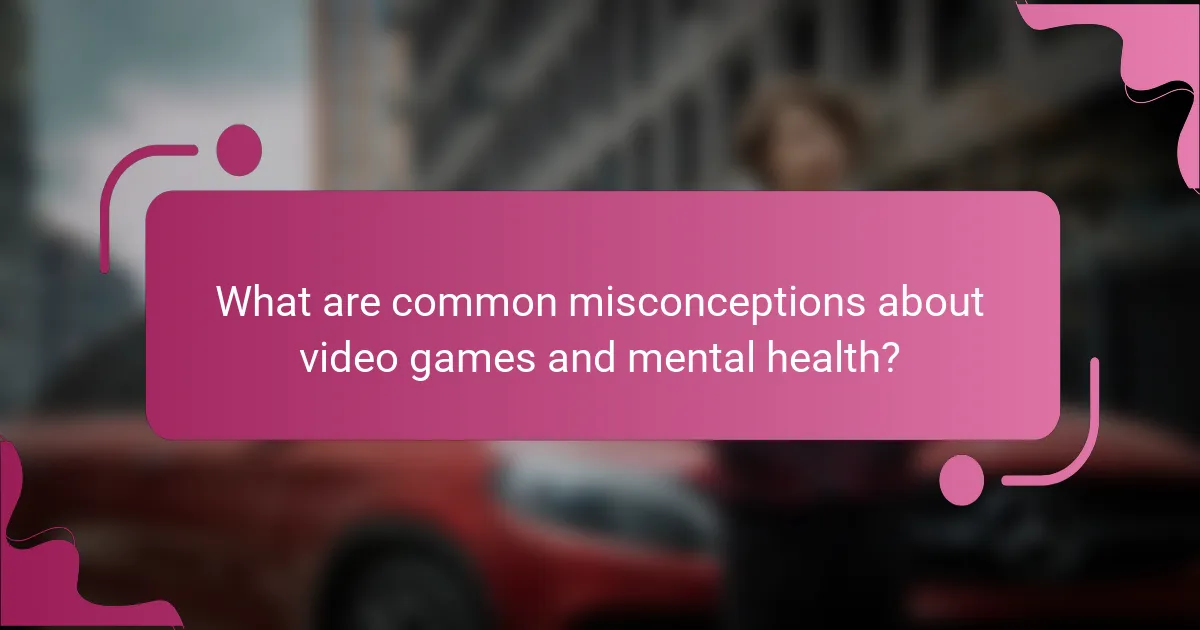
What are common misconceptions about video games and mental health?
Many misconceptions exist regarding video games and mental health. One common belief is that video games cause aggression; however, research indicates that they can enhance social skills and emotional resilience. Another misconception is that gaming leads to addiction; while excessive gaming can be problematic, many players engage in healthy moderation. Additionally, some think video games are solely harmful, ignoring their potential therapeutic benefits, such as stress relief and cognitive skill enhancement. Understanding these nuances is crucial for recognizing the complex relationship between video games and mental health.
Why do some believe video games are solely harmful?
Some believe video games are solely harmful due to concerns about addiction and aggressive behavior. Critics argue that excessive gaming can lead to social isolation and mental health issues. Research indicates that these negative effects may arise from poor gaming habits rather than gaming itself. In contrast, many studies highlight therapeutic benefits, such as improved cognitive skills and stress relief, when gaming is balanced and purposeful.
What evidence challenges the negative stereotypes of gaming?
Research indicates that video games can enhance cognitive skills, social connections, and emotional resilience, challenging negative stereotypes. Studies show that gaming can improve problem-solving abilities, increase attention spans, and foster teamwork. Furthermore, therapeutic gaming interventions have been effective in treating anxiety and depression. For example, a 2021 study found that players experienced lower stress levels after engaging in cooperative gaming sessions. This evidence highlights the positive impacts of gaming on mental health, countering prevalent misconceptions.
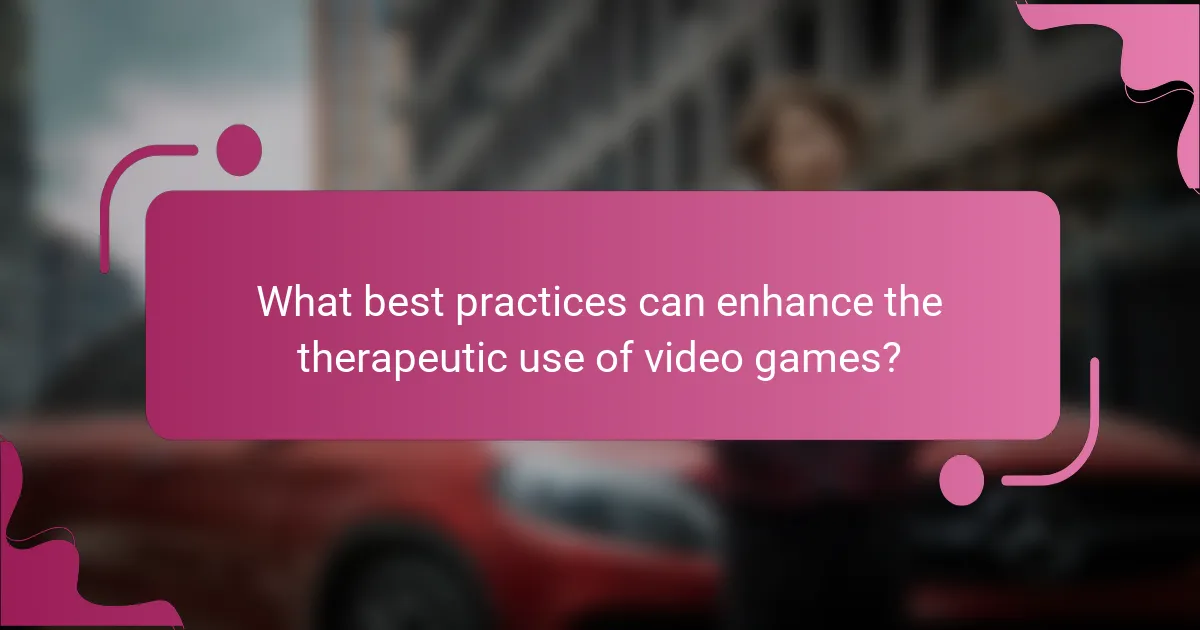
What best practices can enhance the therapeutic use of video games?
Implementing best practices enhances the therapeutic use of video games by ensuring effective engagement and positive outcomes. Focus on selecting games with clear therapeutic goals, such as improving mood or reducing anxiety. Incorporate structured play sessions to provide consistency and predictability, which can foster a sense of safety.
Encourage social interaction through multiplayer games to combat feelings of isolation and build community support. Monitor player responses and adapt game choices based on individual preferences and therapeutic progress. Finally, integrate debriefing sessions to reflect on experiences and reinforce learning, making the therapeutic process more impactful.
How can caregivers and therapists effectively integrate gaming into treatment?
Caregivers and therapists can effectively integrate gaming into treatment by aligning game mechanics with therapeutic goals. They should select games that promote social interaction, cognitive skills, or emotional regulation.
For example, cooperative games encourage teamwork and communication, while puzzle games enhance problem-solving abilities. Regularly assessing the impact of gaming on the patient’s mental health is crucial for adapting the approach.
Incorporating gaming as a reward system can motivate patients and make therapy more engaging. Additionally, therapists can facilitate discussions about game experiences to deepen reflections on emotions and behaviors.
Overall, a structured and patient-centered approach ensures that gaming serves as a beneficial tool in therapeutic settings.
What guidelines should gamers follow for healthy engagement with video games?
Gamers should follow guidelines that promote balanced engagement with video games to enhance mental health. Limit gaming sessions to avoid burnout and ensure regular breaks for physical activity. Set specific gaming hours to prevent excessive playtime. Engage in games that foster social interaction, as they can enhance emotional well-being. Monitor emotional responses during gameplay to identify any negative impacts. Lastly, prioritize games with therapeutic benefits, such as those that encourage problem-solving or creativity.
